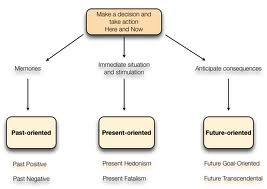
A New Study by BeyondThePurchase.org Explores the Link between Money and Happiness—Reports Costs and Benefits of “Living for Now”
Psychologists describe people who focus attention on the activities and events happening in the present as having a present hedonistic time perspective. We were interested in identifying the costs and benefits of “living for now.” In this study we measured people’s time perspectives, money management skills, tendency to experience positive emotions, and personality factors. Results indicated that focusing on the present has positive impacts on emotions; however, this time orientation may come at a cost to your bank account.
Benefit: People who have present hedonistic time perspectives experience the positive emotions joy, love, amusement, and compassion more frequently. Research has shown that focusing on the past reduces the frequency of positive emotions and compassion for others. To be happier and experience more positive emotions, you can focus on the present more by savoring the experiences you have and enjoying them thoroughly.
Benefit: If you take a present hedonistic time perspective, you tend to value stimulation in your life, and probably agree with statements like “change is good” and “whatever the challenge, bring it on.” The benefit of having these perspectives is intuitive; life is consistently changing and providing new challenges, so being able to adjust to these novelties comes in handy.
Benefit: A present hedonistic time perspective can affect your social life as well. People who focus on the now are more likely to be extraverted, active, and high-spirited. Research has shown that extraverted individuals tend to be happier than intraverts.
Cost: “Living for now” can have detrimental effects on your bank account. Those who have a present hedonistic time perspective report weaker desires to save money. Research has suggested that individuals who score higher on savings management tend to feel more financially secure and are more satisfied with their lives. Focusing on the present is a great way to increase positive emotion and social connections, but it should be balanced with a conscious awareness of the finances being used in the moment as well.
Cost: People who live in the now are also less likely to have financial clarity. This means they are less likely to know how much money they have, what they owe, and know how much to plan for future events. Research has suggested that individuals who don’t manage their money well are more likely to make compulsive and impulsive purchases, have less savings, more debt, and are less satisfied with their lives.
At BeyondThePurchase.Org we help people understand the relationship between money and happiness. To better understand the benefits of specific consumer choices, we continue to investigate the relationships between consumer preferences, psychological needs, happiness, and values at our website by allowing people to take tests on personality. To learn about what might be influencing how you think about and spend your money, register with Beyond The Purchase, then take a few of our personality quizzes:
Do you tend to make decisions considering the past, future, or more immediate needs? Take the Zimbardo Time Perspective Inventory and learn how time perspectives have been linked to a wide variety of human behaviors.
How materialistic are you? Take the Material Values Scale and learn about your spending habits. We think you may learn a lot about what causes you to part with your hard-earned money.
Can money buy happiness? Take our experiential buying survey and on your feedback page you will learn how to spend your money to be happier.
Which spending decisions will make you happiest? Take our Spending Choices and Happiness survey and on your feedback page you will learn how to spend your money to be happier.
How happy are you these days? Take our Happiness and Life Satisfaction quiz and find out your happiness score.
Are you a compulsive buyer? Take the Compulsive Buying Scale and learn about your spending habits.
In what ways do you hope your purchases will transform your life? The Transformation Expectations Questionnaire will tell you about what you expect from your next big purchase.
With these insights, you can better understand the ways in which your financial decisions affect your happiness. Responses to these surveys will also help researchers further understand the connection between money and happiness.
Incoming search terms:
- MoneyandHappiness:TheCostsandBenefitsofLivingforNow|BeyondThePurchaseBlog
- well managed money and happiness
- how much does happiness cost
- happiness cost
- more benefits happiness
- nbps blog
- novelties blog
- relationship between focus time & money
- specific ways perspectives affect happiness
- time orientation and perception of emotion

